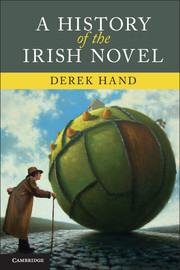Book contents
- Frontmatter
- Contents
- Acknowledgements
- Introduction A history of the Irish novel, 1665–2010
- Interchapter 1 Virtue Rewarded; or, the Irish Princess
- Chapter 1 Beginnings and endings
- Interchapter 2 Beyond history
- Chapter 2 Speak not my name; or, the wings of Minerva
- Interchapter 3 Edith Somerville and Martin Ross's The Real Charlotte
- Chapter 3 Living in a time of epic
- Interchapter 4 James Joyce's Ulysses
- Chapter 4 Irish independence and the bureaucratic imagination, 1922–39
- Interchapter 5 Elizabeth Bowen's The Last September and the art of betrayal
- Chapter 5 Enervated island – isolated Ireland? 1940–60
- Interchapter 6 John Banville's Doctor Copernicus: a revolution in the head
- Chapter 6 The struggle of making it new, 1960–79
- Interchapter 7 Seamus Deane's Reading in the Dark and the rebel act of interpretation
- Chapter 7 Brave new worlds
- Interchapter 8 John McGahern's That They May Face the Rising Sun
- Conclusion The future of the Irish novel in the global literary marketplace
- Notes
- Bibliography
- Index
Chapter 2 - Speak not my name; or, the wings of Minerva
Irish fiction, 1800–91
Published online by Cambridge University Press: 05 June 2012
- Frontmatter
- Contents
- Acknowledgements
- Introduction A history of the Irish novel, 1665–2010
- Interchapter 1 Virtue Rewarded; or, the Irish Princess
- Chapter 1 Beginnings and endings
- Interchapter 2 Beyond history
- Chapter 2 Speak not my name; or, the wings of Minerva
- Interchapter 3 Edith Somerville and Martin Ross's The Real Charlotte
- Chapter 3 Living in a time of epic
- Interchapter 4 James Joyce's Ulysses
- Chapter 4 Irish independence and the bureaucratic imagination, 1922–39
- Interchapter 5 Elizabeth Bowen's The Last September and the art of betrayal
- Chapter 5 Enervated island – isolated Ireland? 1940–60
- Interchapter 6 John Banville's Doctor Copernicus: a revolution in the head
- Chapter 6 The struggle of making it new, 1960–79
- Interchapter 7 Seamus Deane's Reading in the Dark and the rebel act of interpretation
- Chapter 7 Brave new worlds
- Interchapter 8 John McGahern's That They May Face the Rising Sun
- Conclusion The future of the Irish novel in the global literary marketplace
- Notes
- Bibliography
- Index
Summary
The owl of Minerva spreads its wings only with the falling of the dusk.
(G. W. F. Hegel, The Philosophy of Right)The dominant paradigm of the nineteenth century in the Western world is one of progression and development. G. W. F. Hegel and his intellectual disciple Karl Marx theorised development on a number of philosophical and economic levels. Charles Darwin, too, famously based man's development on more material and prosaic grounds. In short, progress and progression pervade all levels of thought and existence from the individual to the social and the national. So central is this idea to Western thought that Hegel could declare that those places – such as the entire African continent – which did not share in this narrative of development and progression had ‘no historical part of the World; [having] no movement or development to exhibit’. Such regions were outside history. And yet Hegel's words express, perhaps, the opposite of intended superiority, suggesting not the boundless possibilities but rather the limits of Western knowledge. In other words, something is going on in a place such as Africa but the West can never know of it or express it because it will always be beyond its thought processes, its system of knowing. Such an interpretation – perhaps only possible in retrospect – moves colonial relationships beyond the merely binary and opens up a more complicated notion of the interactions between differing cultures.
- Type
- Chapter
- Information
- A History of the Irish Novel , pp. 70 - 105Publisher: Cambridge University PressPrint publication year: 2011



